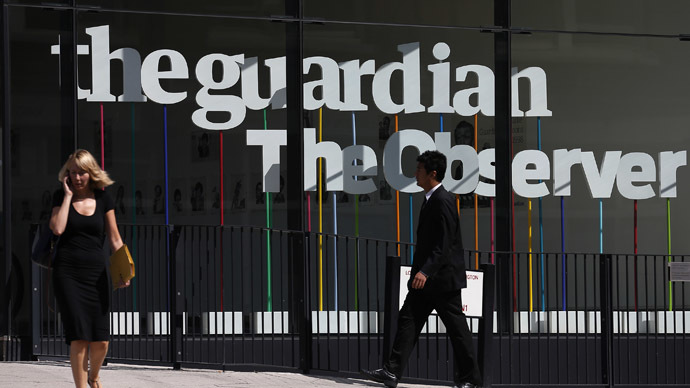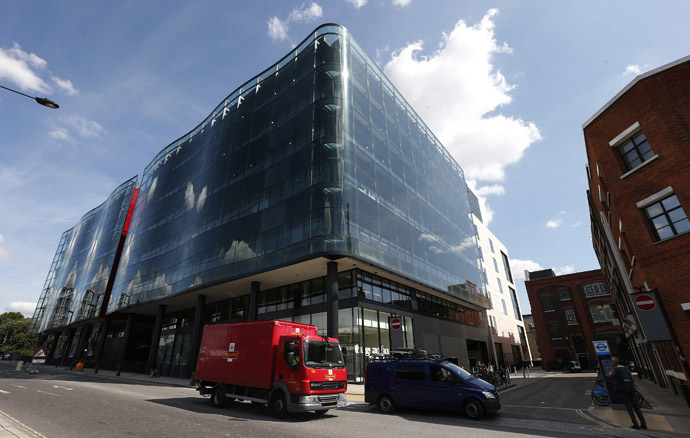No more the Guardian of quality reporting?

I sometimes flatter myself that I have seen it all and that nothing would surprise me these days, but that proved over-optimistic last week when a colleague sent me an article on the Cryptolocker computer virus published by The Guardian.
After quickly scanning the article, I asked if he was trying to say I should be doing something about my computer security.
“Are you blind?” he asked irritably, “I didn’t send that to you for you to think about your computer! I sent it because I thought you’d be interested in the fact that it’s sponsored content. It’s an advertorial – in The Guardian! What is the world coming to?”
And that right there encapsulates the issue perfectly. I’d been forwarded an article that someone had told me was ‘interesting’ and, like so many people, I’d hurriedly flicked through it, swiping past the sideline graphic that indicated the content was sponsored by two private companies (Fujitsu and Symantec), and then I’d done exactly what those companies wanted me to do – consider improving my computer security. According to Fujitsu’s website, the company has been cooperating with Symantec to develop secure cloud-based computing solutions for some time and The Guardian article certainly slathered the pressure on its readers to shell out for such solutions, stating that computer users need to “take action now”, twice specifying the urgency of acting within a “two-week window” before noting that a website which helps users with computer security for free is down and closing with a discussion of Symantec’s victory over data-stealing virus Zero Access in 2013. No other software competitors were named in this perfect advertorial, nor were the fee Fujitsu and Symantec handed over to “sponsor” this piece of not-so-investigative journalism specified.
When I began to examine the situation more closely things got even more interesting. For one thing, the article in question entitled “Global Police Operation Disrupts Aggressive Cryptolocker Virus” is labeled as sponsored content on the Guardian’s mobile site, but not on its desktop-accessible site, which means that many readers are completely unaware of the fact that it is sponsored by private companies (who stand to profit from the article’s content). If this was an editorial oversight, it was a pretty big one.
Flicking through The Guardian’s website, I quickly discovered an entire ream of “sponsored” content in a newspaper that is supposed to be the last bastion of liberal Western intellectualism. It’s hard to quote the Daily Mail in a scholarly article without getting some funny looks, but The Guardian slips down the gullet of establishment authority with nary a second glance. Yet here were articles like:
“Make your Business Communication Watertight with Office 365 from O2” sponsored by (surprise, surprise) O2; “Explore a Literary Landscape” (a three-way collaboration where Tourism Ireland sponsored an article by author MJ Hyland about her trip to Northern Ireland, which managed to name-check two hotels and four restaurants in only a few short column inches); and “Reform Land, Transform Nigeria!” (advocating laws to tighten protection of private land ownership in Nigeria) sponsored by the Adam Smith Institute, which after 20 minutes of research, I still hadn’t satisfactorily gotten to the bottom of. However, I’m not surprised that an “institute” (albeit one that alleges to have a 100 million pound annual turnover) choosing to name itself after Adam Smith, author of The Wealth of Nations and idol of laissez-faire capitalists, sees tightening protection for land owners in countries that haven’t historically had that kind of relationship with land as a priority of the first magnitude.

All of these articles were presented in just that way: as objective articles written by professional reporters- not as advertisements. In fact, most of them were written by someone with the illustrious title of ‘Guardian Professional’. Admittedly, the latter three named articles (which are just a smattering of what is out there) hover under a banner displaying the name of the sponsor and there is a tagline at the bottom or on the sidebar explaining that the content was paid for by the sponsor and generated by ‘Guardian Labs’ (because apparently this kind of high-end content can only be produced under laboratory conditions). But these notices look just like any other of the numerous ads displayed on newspaper web pages, and I’m inclined to think that many people, like me, have trained themselves to ignore anything but text in the interests of actually managing to read an article from end-to-end. It means that we’re liable to ignore even something as obvious as a headline banner that at best implies that not only did someone find this a convenient place to put an ad, they are actually paying for the article content.
Of course, The Guardian would dispute that anything as base as paying for content went on in regards to the Cryptolocker article. As far as they are concerned, it’s all just a happy alignment of interests. According to the newspaper’s own lengthy explanation:
“Sponsored content is editorially independent. We accept funding from sponsors both for content we are already producing, where using funds from a sponsor allows us to provide more in depth coverage, and for new projects.”
Which, to me, would seem to mean that if Fujitsu and Symantec had not forked over the cash, The Guardian may only have been able to push the urgency of immediate consumer action once in the article, as opposed to three times, which certainly added more depth to their coverage, in that the bottom got a whole lot lower.
Mercifully, The Guardian later clarifies:
“A sponsor whose branding appears on editorial content may have a role in suggesting what kinds of topics are covered, but the commissioning editor is not obliged to accept ideas from the sponsor.”
I doubt, however, that the Symantec logo would have been shyly wafting to one side of an article where the reporters (yes, it took two of them to produce this text) had decided to use an example of a competitor’s previous success in quashing malware instead of Symantec’s own.
The latter three articles I cited, on the other hand, were in The Guardian’s opinion, straight-up advertisements where according to its own version of events “content has been paid for and produced to a brief agreed with a third party organisation, whose brand it displays”. These ‘advertisements’ don’t look like ads though, or even opinion pieces – they look and sound like ‘objective’ articles and the potential for chaos to ensue in quoting and re-quoting these articles is sky-high. If someone was to give me a piece of information that was in The Guardian, or I was to see it cited in a footnote, I wouldn’t normally be inclined to immediately ask who paid for it. I would assume it was a product of fact-checked journalism, rather than simply a claim made by an interested party.
Of course, The Guardian didn’t invent the advertorial, and I’m sure that if we all saw some similar travesty trolling for people to buy moisturizer at the back of a fashion magazine, we wouldn’t bat an eye. But we’re not talking about something as silly as a skin care fad here; in some cases we’re talking about the legislative apparatus of entire countries.

I’m not sure the advertorial is the appropriate forum to be discussing the fate of millions. Surely it’s somewhat more comforting to think that anything that gets published has to at least pass a basic newsworthiness test and that any facts that sound too off will trigger a journalistic alarm bell to have them checked. And surely it’s somewhat more comforting to think that items that are newsworthy will be published whether or not the people involved in those items have the money to pay for publication. The way things stand now, if Tourism Ireland is willing to stump up for an advertorial, I suppose Visit Wales will have to dig deep and come up with the same kind of cash to stay competitive. And guess what? They did. I do hope that anyone who wants to share communal land in Nigeria has the same kind of resources at their disposal.
The Guardian, I am sure, would say that they are strapped for cash and that ultimately it’s our fault for skimming our news off websites because none of us can make the effort to do something as simple as buying a newspaper anymore. But it’s not like they don’t float in a broth of advertising for master classes, job placements and something called ‘Guardian Dating’, not to mention the totally undeserved benefits they must have derived from people like Assange and Snowden dumping long-running, high-interest stories straight into their laps over the past few years. If something absolutely had to be done, I would have preferred them to go the classic route and adopt a sidebar of shame (the screeching and seemingly inexhaustible celebrity ‘news’ you’ll see featured on the sidebar should you ever need to venture into e.g. Daily Mail territory) or offer me a mail-order bride from whatever country the article I just looked at took place in. You can always rest a sheet of paper up against the sidebar and compared to made-to-order advertorials it definitely would have been the classier solution.
The statements, views and opinions expressed in this column are solely those of the author and do not necessarily represent those of RT.
The statements, views and opinions expressed in this column are solely those of the author and do not necessarily represent those of RT.













